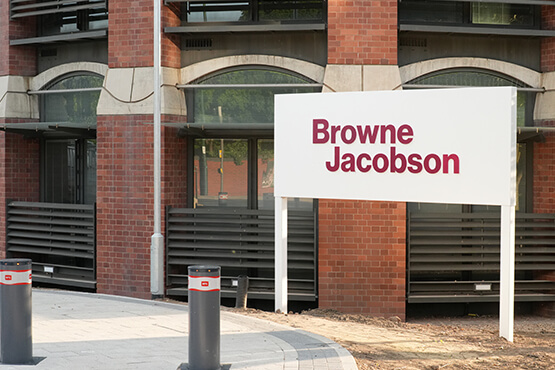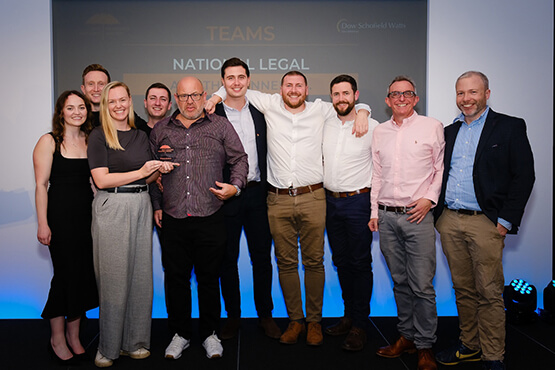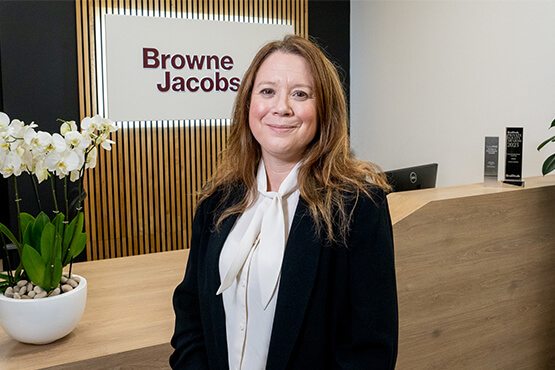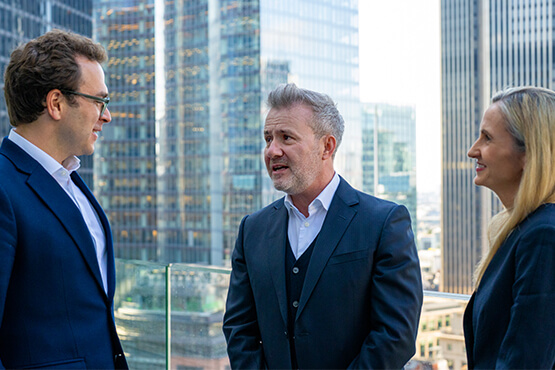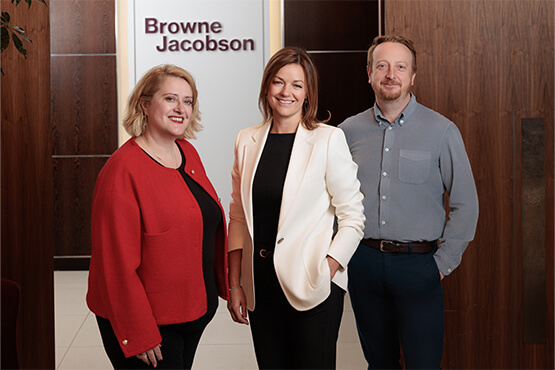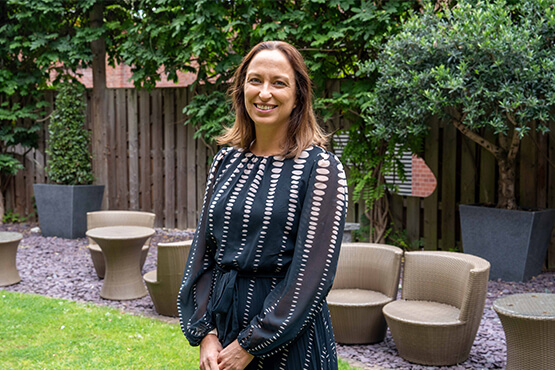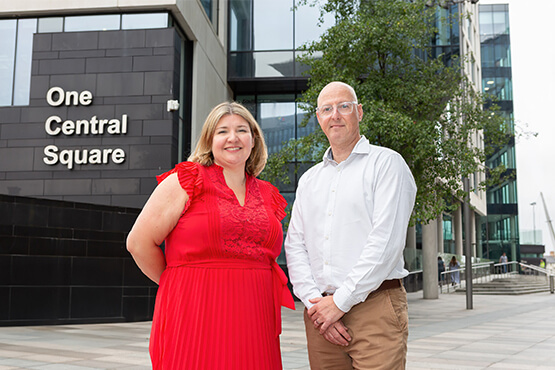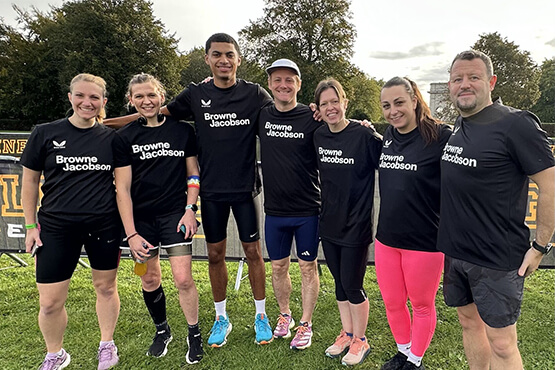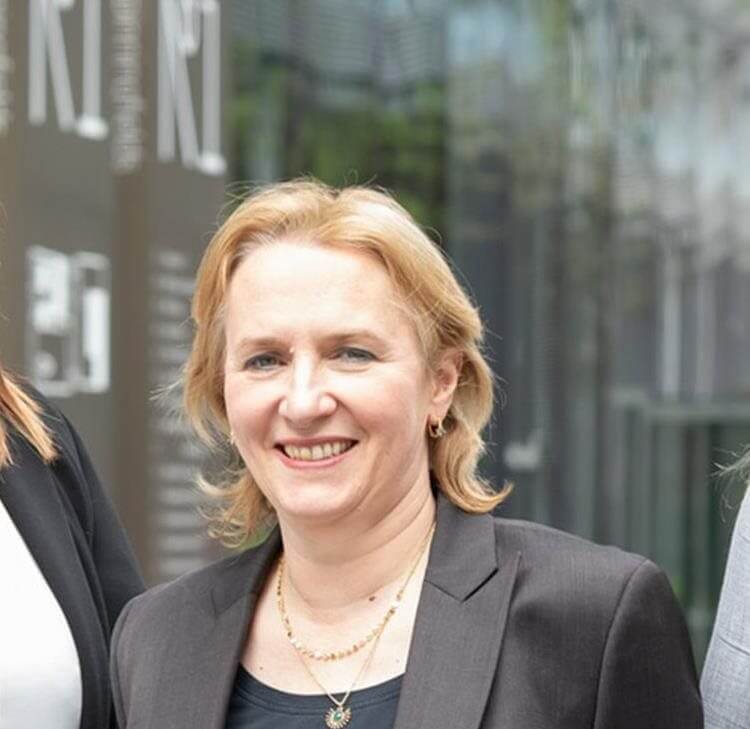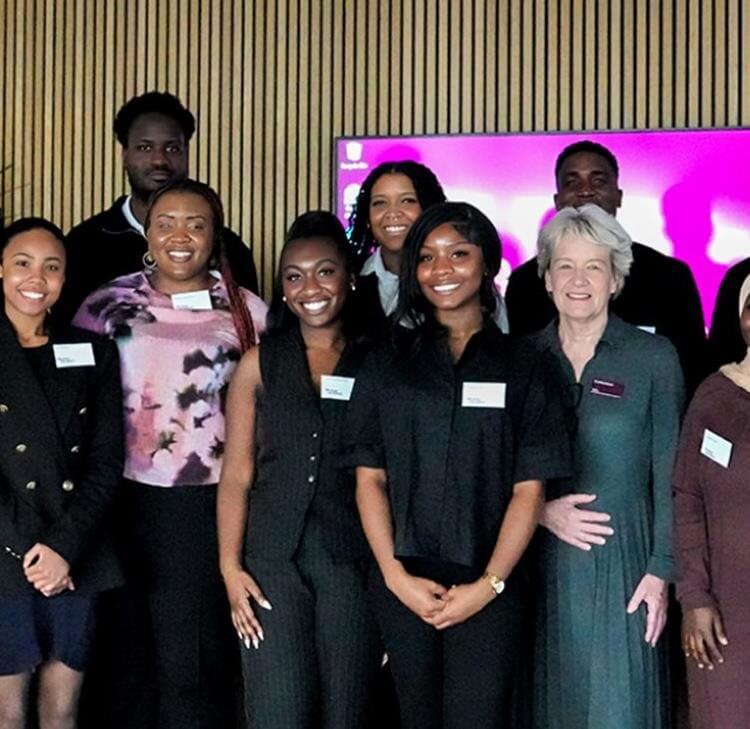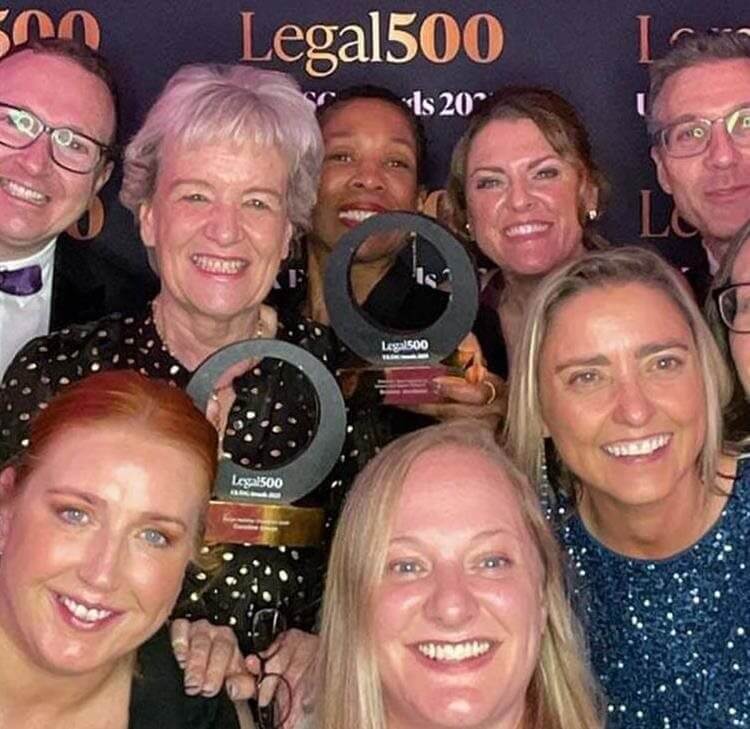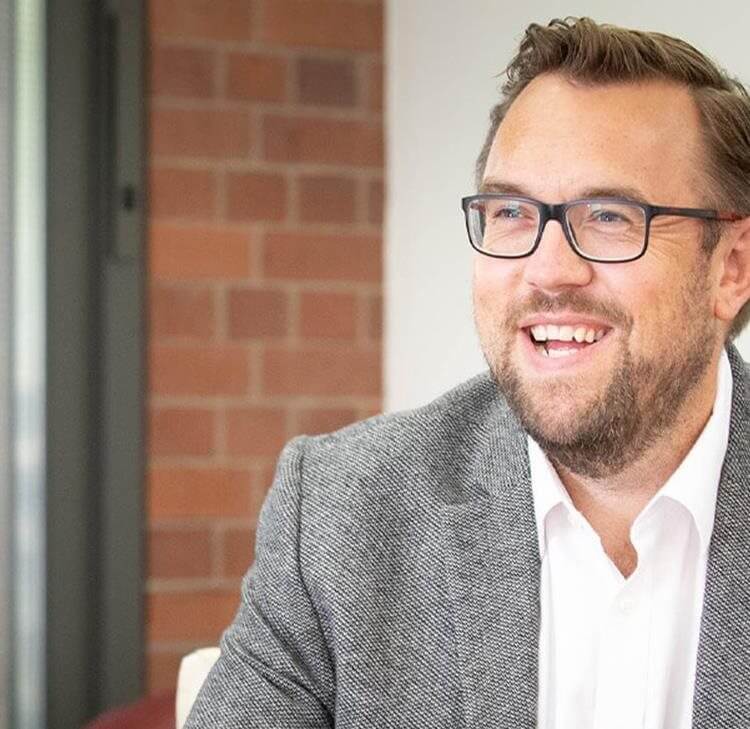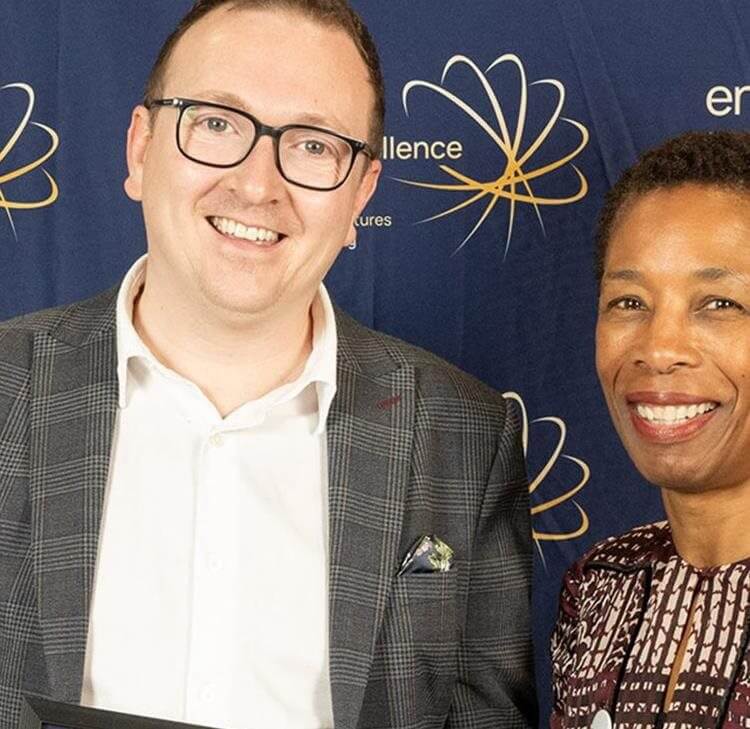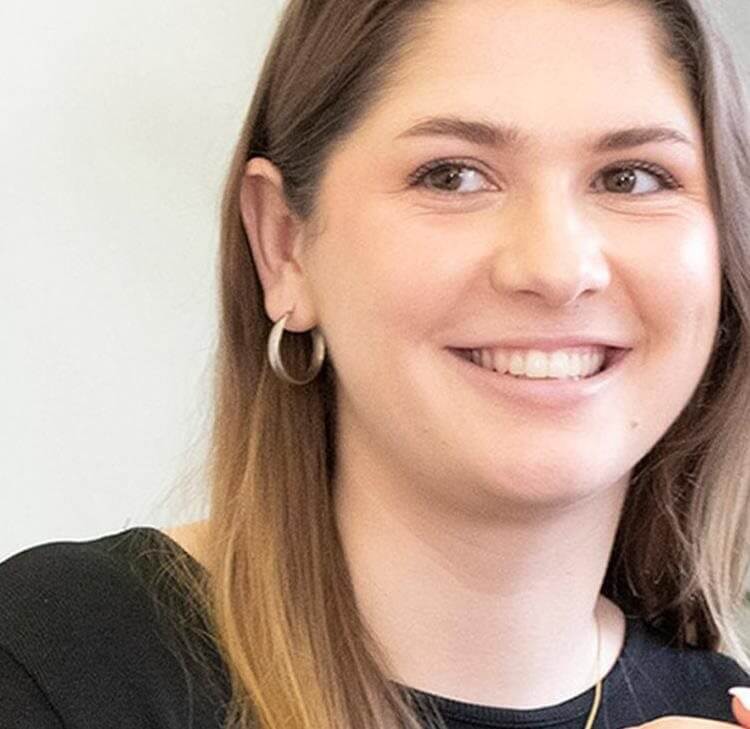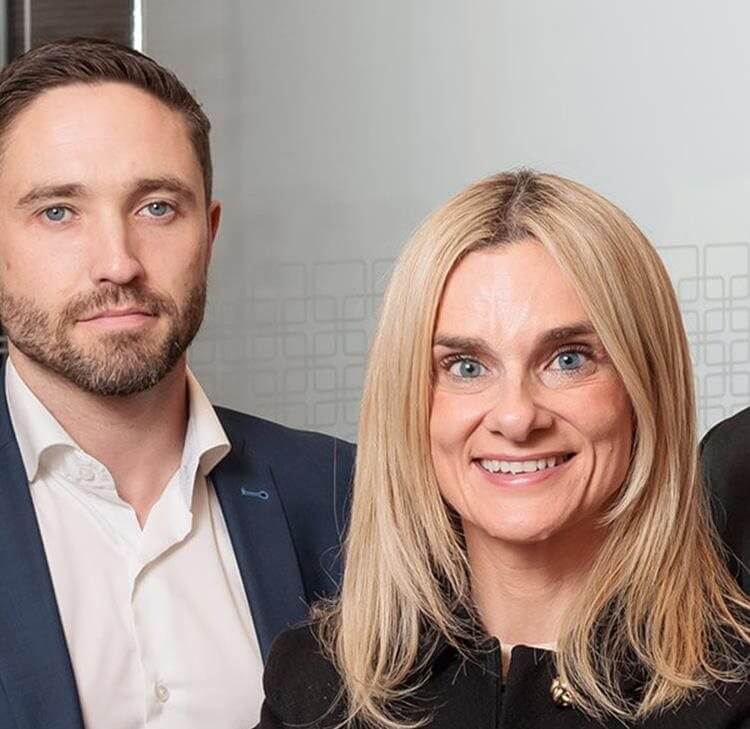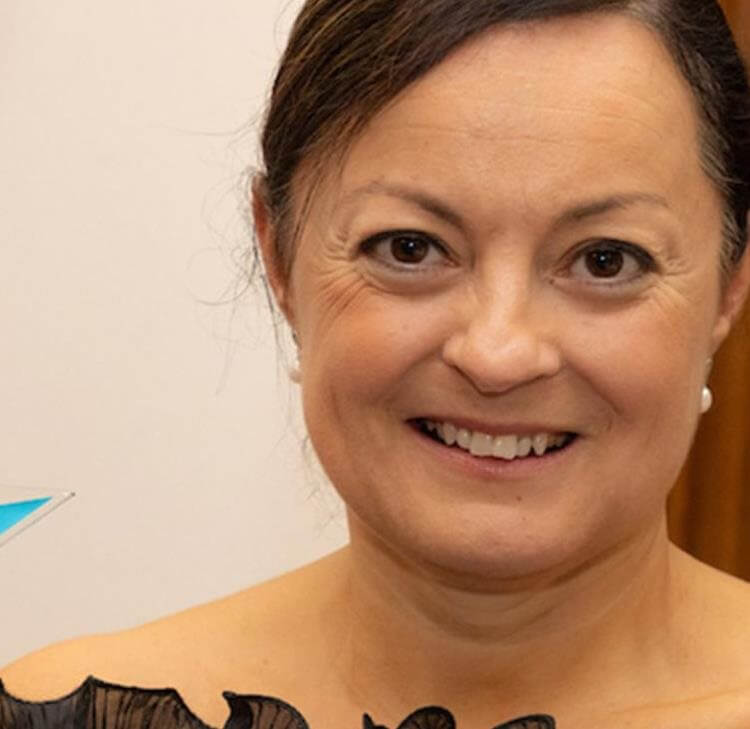Hey Browne Jacobson: how do I become a solicitor?
Ask a careers advisor and many will say good A-levels, a 2:1 or above in a qualifying law degree, followed by the Legal Practice Course (LPC) and a strong training contract application. Many law firms’ websites say much the same thing. However, at Browne Jacobson we welcome applicants from all walks of life and want people that stand out from the crowd.
What route did our trainees choose?
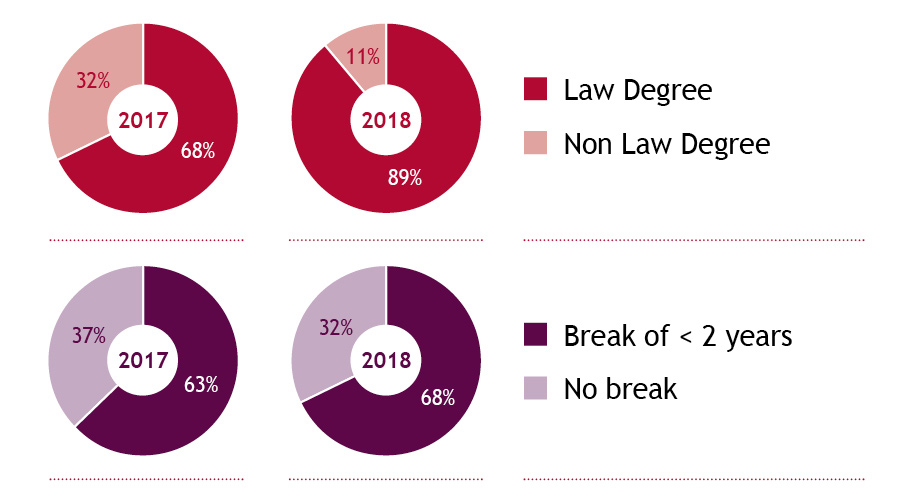
32% of the 2017 intake and 11% of the 2018 intake did not complete a qualifying law degree, instead opting to complete a non-law degree followed by the GDL.
63% of the 2017 intake and 68% of the 2018 intake took a break of more than two years following graduation and before commencing their training contract (i.e. they didn’t go straight from university, to the LPC and straight in to a training contract).
- How do I become a solicitor without a law degree?
- Which is the best route for me?
- What could I do between completing my degree and starting my training contract?
As a diverse range of trainee solicitors, legal apprentices and pupil barristers, we have taken our time to give you an insight into our journey to becoming a solicitor:
- The direct route
- Unconventional routes
- GDL
- Paralegal experience
- Second career
- Vacation scheme
- Apprenticeship
- In-house pupillage
If you would like more information on a career in law, please contact Zena Comrie.
“The firm is focusing on accepting people from all backgrounds and has a strong culture of accepting and encouraging diversity in all areas.”
The direct route to becoming a solicitor
Applying during my degree: the benefits of having a clear goal
Route to law: I studied law at Nottingham Trent University on the Law LLB (Sandwich) course. In the third year of my degree I completed one year working at Hastings Direct Insurance working as a Claims Professional Placement Student. This involved handling policyholder and third party motor insurance and property damage claims. It was during this year that I secured a training contract with Browne Jacobson. I subsequently completed my LPC and Masters at Nottingham Trent University, whilst also working part-time as a Legal Assistant in the Health Advisory and Litigation team, before starting my training contract in September 2017.
Advantages: It was useful having worked as a claims handler. My first seat in Technical Claims and my second seat in Financial and Professional Risk both required me to receive instructions from and communicate with claims handlers – knowing the pressure they are under and having experience of the job they are doing definitely helped! Also, my route has been quick – I have benefitted from always having a clear goal and focussed on how to achieve it.
Disadvantages: I am always interested in people with other routes into law. The range of degrees and life experience the trainees have – from science degrees to several years’ experience working in the public sector – it can feel as if my route appears almost obvious. I have never taken a break or breather from my ambition and going about achieving it – hence my advice below.
Advice: Enjoy every experience and take confidence from achievements. Sometimes, when making ambitious and career-driven choices, it’s easy to always focus on the next goal at the expense of enjoying the journey and celebrating achievements on the way. At every stage, look back and be proud of where you are.
Daniel Meyer, Trainee Solicitor (second year) - Retail Property
If you have something different to offer, be prepared to show it off
Route to law: I finished my LLB in 2013 and went straight into public-sector work, beginning my career as a caseworker in the Legal Aid Agency. I then went on a secondment where I worked as a legal assistant for a team of Ministry of Justice commercial lawyers. It was there where my interest in law was 'reignited' and I decided I wanted to train as a solicitor. When the secondment ended I took a job in the MoJ working as a commercial contracts assistant whilst studying the LPC part time.
Advantages: Having worked in several different roles since finishing university, I’ve become adept at picking up new skills and adapting to unfamiliar situations. I think this has helped me deal with the stress of moving seats every six months.
I’ve also found that working in a non-legal setting has helped me to see the bigger picture in terms of understanding where legal advice fits into a project and being able to see an issue from the client’s perspective.
Disadvantages: Having worked in the public sector since graduation, I struggled initially with aspects such as time-recording, managing my own caseload and the general faster pace of work. Having never worked in a law firm I was unprepared for the change in culture and pace and it took me a while to become accustomed to these new aspects.
Advice: My advice would be that there is no right or wrong path into law. If you have something different to offer, be prepared to show it off and be ready to explain how your skills are valuable and relevant regardless of how you acquired them.
Olivia Watkinson, Trainee Solicitor (second year) - Government & Infrastructure
Unconventional routes to becoming a solicitor
Why not having A-levels didn’t stop me: perseverance, passion and persistence
Route to law: I had to leave sixth form due to financial pressures and instead secured a business apprenticeship where I interacted with a variety of professions. Following this, I enrolled on a part-time Legal Methods course at Birkbeck, University of London whilst juggling full-time employment and secured a place at the University of York. From there I embarked on a rigorous application process for the Law Society’s Diversity Access Scheme to be awarded their scholarship which included LPC funding and guidance for entering the profession. After the LPC I was fortunate to secure paralegal experience at a couple of firms including as a paralegal in Browne Jacobson’s Health Advisory Litigation department. I spent two years’ experience as a paralegal before securing a training contract through the firm’s internal applicant assessment centre.
Advantages: Exploring other businesses and sectors equipped me with team work, leadership and public speaking skills. I obtained a social, political and economic insight which set me apart from candidates with little or no prior work experience. As a paralegal, I gained vital legal skills in time recording, case management and handling confidential information. Moreover, I could use the skills and insight obtained to better understand internal and external clients and bring diversity to the legal profession.
Disadvantages: One of the perceived disadvantages of this route is the length of time between the training contract offer and starting date. Law firms recruit up to two years in advance. However, like many trainees I took some time out for travel and exploration. This gap is a perfect opportunity to take your foot off the gas and refresh by taking a career mini-break. Following some life changing moments in Australia, I returned refreshed and ready for my training contract.
Advice: Always apply the three P’s when making legal applications: perseverance, passion and persistence. Moreover, remember that interviewers do not know you personally so you must demonstrate who you are at every opportunity. Interviews only give a snapshot of you, so don’t take rejection personally. It’s always worth requesting feedback and taking a constructive lesson from every rejection.
Lynette Wieland, Trainee Solicitor (second year) - Corporate
Transferable skills: how experience in recruitment, retail and HR developed me into the trainee I am
Route to law: After completing my A-Levels at sixth form, I decided to embark upon an Art Foundation Course. After about 10 days, I realised that learning about the primary colours wasn’t for me and I decided to take a year out to think about what I really wanted to do, working in retail at House of Fraser in the meantime. The next year, I commenced Law with Criminology at Nottingham Trent University and following graduation, I completed the LPC. After the LPC, I felt like I needed to gain some experience in the 'real professional world' and so I worked in legal recruitment and then in an HR department for a large school academy trust. I secured a paralegal role at Browne Jacobson defending clinical negligence claims for the NHS, where I stayed for a few years before securing a training contract at the firm through our internal route.
Advantages: I didn’t want to rush off to University like everyone else after sixth form so I felt like the time I took to consider my options was really beneficial. I learnt so much from working in professional environments, things they don’t teach in university and so when I joined Browne Jacobson, I was able to transfer a lot of the skills I had developed such as networking, client care, communication, team work and generally just how to be a grown up. It also meant that when I applied for my training contract, I was able to give a variety of examples from my previous work experiences which I believe really helped my application.
Disadvantages: The only real disadvantage would probably be the time it took to secure my training contract, but that was my choice as I wanted to spend time working in other environments before I started in law.
Advice: Take up any opportunity for work experience people offer you and don’t be afraid to ask for advice and put yourself out there. If you don’t ask, you don’t get!
Scarlett Kates, Trainee Solicitor (second year) - Financial and Professional Risk
From trainee payroll administrator to trainee solicitor: how working from 17 gave me the work ethic and resilience to succeed
Route to law: After my GCSEs I left school with little to no direction as to what I wanted to achieve in my career so found work as a trainee payroll administrator. Within two years I had progressed from trainee to a senior member of the team. I wanted something more challenging so decided to pursue a career in law. I went to college and obtained an Access to Higher Education Diploma, studied law at university, worked as a paralegal at Browne Jacobson and obtained my training contract via our internal route.
Advantages: Working full time in a professional environment at the age of 17 taught me an awful lot. I was managing my own workload, meeting important deadlines, working in a team and providing client care – all essential skills for a lawyer. Taking a three year break from education gave me some perspective on what was important for me and I was incredibly focused at college and university which helped me to achieve the grades I needed to get to the next step of my career. I have a wealth of work experience which meant that when I started as a trainee solicitor all I had to do was focus on learning the law!
Disadvantages: A lot of people are surprised that, as a trainee solicitor, I don’t have any A Levels. I’m trying to think of how this has disadvantaged me but it genuinely hasn’t. At the time, leaving school was absolutely the correct choice for me. My hard work and perseverance has developed my resilience and means that I have a more optimistic outlook in general.
Advice: Remain positive, don’t rush and don’t worry about achieving professional milestones by specific deadlines because there is a risk that you’re unnecessarily setting yourself up to fail. The longer it takes you to become a solicitor the more time you have to build on both legal and non-legal experience. Pursuing a legal career is a huge investment so you need to be sure it is the right one for you!
Sarah Hamilton, Trainee Solicitor (second year) - Corporate
GDL
GDL: from lab to library – how the GDL provided the pathway
Route to law: At college I was torn between whether I wanted to become a lawyer or become a brewer. To keep both doors open, I studied Molecular Biology at University. It was clear by third year that I was much more suited to the library than the lab, and I made the decision following graduation to apply for training contracts. I was fortunate to get a training contract offer the same summer, and was able to go off to law school to study the GDL and LPC before finally starting at Browne Jacobson in September 2017.
Advantages: Science lends itself to certain skills such as attention to detail, and being able to present often complicated information to lay-individuals. It may come as a surprise to some to know how heavy on literature my degree was – hours upon hours scrolling through often uninteresting papers on 'PNAS' or 'nature' has prepared me well for some of the more arduous contracts that land on my desk!
Disadvantages: Starting my training contract without any paralegal experience was tricky. It takes a while to get to grips with some of the day to day tasks in your job – whether that’s time recording or building confidence speaking to clients over the phone. You can’t become a good lawyer by studying alone, and I have found the most important learning and development has taken place on the job itself which the paralegal route undoubtedly assists with.
Advice:
- never drop your effort levels – this is a difficult career choice and you need be ready for that!
- do better on your Crop Pests module…
- be confident - have faith that you have the skills and ability to be successful, and focus on yourself - not the competition.
Aidan Southall, Trainee Solicitor (second year) - Banking
GDL: from history to law – why the 'longer' route was so valuable
Route to law: I have an undergraduate degree in History from University of Sheffield. I then stayed at Sheffield to complete the GDL. I decided at that point to leave higher education and get some work-based experience in a law firm which landed me a paralegal job in the Health, Advisory and Litigation team in Nottingham. I then moved departments to Financial and Professional Risk during which time I got my training contract with Browne Jacobson. Before starting my training contract I completed the Accelerated LPC (six month course) at University of Law, Birmingham.
Advantages: History degree / GDL: I love history, studied it for three years, and have still ended up where I want to be in my career. It was always a talking point when being interviewed.
Disadvantages: History degree / GDL: It is harder to be engaged at university with the legal world when you are doing a history degree. It isn’t impossible though, you just have to be more proactive and find events or information yourself. Paralegal: Being a paralegal then a trainee is quite a big jump when you are settled as a paralegal. I spent a year and a half in this role so I was comfortable in my team and area of law.
Paralegal: I knew that I wanted to do law before doing the LPC/training contract due to practical experience. Being a paralegal made me a better trainee and gave me a base level of legal skills beyond that I had learned at university.
Advice: Keep going – there will be times that you convince yourself that you aren’t going to end up where you want to. You may have to take a ‘long’ route e.g. GDL/Paralegal but in hindsight this was very valuable & something I would now promote to anyone thinking of doing the same.
Jessica Fellows-Moore, Trainee Solicitor (first year) – Commercial Property
Vacation scheme
Making the most of my Browne Jacobson vacation scheme
Route to law: I secured my training contract in my third year of university via a vacation scheme. I spent two weeks working in the Commercial Property team in the Birmingham office and one week working in the Corporate team in the Nottingham office. I had the opportunity to start my training contract one year earlier, straight after completing my LPC.
Advantages: Securing my training contract through a vacation scheme was a great way to experience the firm’s culture and consider whether it was a good fit for me. It was also an opportunity to get exposure to the clients, the type of tasks and standard of work I would have been expected to perform as a trainee solicitor. I met people from different departments, gained a better understanding of the firm’s key areas of legal practice and visited three offices, which later helped me in deciding which seats to apply for within the training contract.
Disadvantages: I had never worked before joining Browne Jacobson, aside from previous short work experiences, so this is my first proper job, which is intimidating and overwhelming sometimes! Perhaps, working as a paralegal before becoming a trainee solicitor would have been helpful and would have provided me with more confidence and a solid ground to build on.
Advice: Make the most of every work experience you can get. It does not have to be a legal work experience; anything can assist in developing skills which may be useful in a career in law.
Do not ignore your weaknesses, be aware of them and focus on how you can improve from an early stage even if it seems challenging e.g. by attending trainings.
Valentina Tostato, Trainee Solicitor (second year) - Construction
Paralegal experience
Not having a plan: how paralegal experience helped me decide law was right
Route to law: I completed a law degree at the University of Birmingham and then did some ad hoc admin support roles for six months. I got my first job as a paralegal at Eversheds on a fixed term contract assisting with a public inquiry. At the end of my time at Eversheds I applied to Browne Jacobson as a paralegal in Commercial Health, Birmingham. I worked there for a year and was encouraged to apply for the training contract which I did and was luckily successful. I then left to complete the LPC.
Advantages: When I left University I really wasn’t sure what I wanted to do. I hadn’t completed any practical legal experience previously and wanted the opportunity to know what I was getting myself in for before I stressed myself out with training contract applications! Working as a paralegal at the firm really aided my knowledge and confidence in applying and I think I did better on the assessment day because of it.
Disadvantages: Many of my friends are already qualified having applied to train straight from University. This does make me feel somewhat behind especially considering how long the training process is. On the flip side, I haven’t worked outside of law in many years and I think the benefit of some real life experience separate to law may have really helped my practical knowledge and maturity as an advisor.
Advice: Not having a plan really worked out for me as I was able to progress at my own pace. If I had to say anything, I would say trust yourself and don’t compare yourself to others.
Lucy Coe, Trainee Solicitor (second year) - Property (Development and Housing)
Experience counts: after years of paralegal experience, it was worth being brave and submitting my application
Route to law: I finished my law degree in August 2012 and started working at Browne Jacobson as an administrative assistant a few weeks later in September 2012.
In November 2013 I changed roles to a Legal Secretary whilst a colleague was on maternity leave. When she came back to work in October 2014 I changed roles again, this time to a Legal Assistant specialising in complex civil liability claims.
Browne Jacobson offered me a training contract in August 2016 (which I gladly accepted!) and a year later I started LLM LPC. My first seat, in Commercial Health, started in September 2018.
Advantages: Although I was experienced in giving legal advice from my time volunteering at Citizens’ Advice Bureau as a student, before coming to Browne Jacobson I had never worked in a law firm. Working in the firm before applying for a training contract gave me time to find out more about the firm and whether we were a ‘good fit’ before taking the metaphorical plunge!
Also having the opportunity to first type out dictated pleadings and legal advice reports, and later draft my own was invaluable practical experience that really drove it home that a career as a solicitor was something I wanted to pursue.
Disadvantages: In working for such a long time after university, instead of following the traditional vacation scheme-to-training contract route, it has taken much longer for me to qualify as a solicitor than most.
Advice: I wish I could advise my past self that I had more than enough legal/fee earning experience so to be brave and submit my training contract application!
Kerry Cahalane, Trainee Solicitor (first year) - Commercial Health
Law as a second career
Starting again from scratch: walking away from one successful career to start another
Route to law: I completed my first degree in Oceanography and Chemistry at the University of Liverpool about 15 years ago.
After graduating, I started working in the public sector and spent over a decade working in the Civil Service in a variety of roles including customer service, corporate communications, estates & contract management and performance evaluation & reporting.
I also spent a number of years as a senior elected trade union officer, leading negotiations on behalf of tens of thousands of trade union members on issues such as Civil Service Reform and the change agenda, job security & redundancy avoidance, pay and terms and conditions.
In 2015 I decided to pursue a career in law and commenced my GDL in Birmingham before securing my training contract here at Browne Jacobson in 2017.
Advantages: I’ve been surprised how many of the skills I’d developed over the years are relevant to the work that solicitors do.
More valuable than the skills though, has been the understanding of the public sector that I gained from being immersed in it, both delivering public services on the front line and engaging with senior leaders on strategic issues through my trade union role.
Since joining Browne Jacobson I’ve learned that to deliver exceptional client service you need to understand your client, their aims and objectives, the sector they operate in and the challenges they face. My experience in the public sector has been invaluable in enabling me to think commercially and add real value for our clients.
Disadvantages: It’s not easy to walk away from a successful career and to start again from scratch. My confidence definitely took a knock as I realised that after a lot of hard of work and relative success (and too years gone by!) I was virtually back at square one.
I’ve also had to unlearn a few public sector working practices that were deeply ingrained but really aren’t suited to the commercial world of legal practice.
But I wouldn’t change the experiences I had before commencing my training contract – I know that ultimately they’ll make me a better lawyer.
Vicki Searle, Trainee Solicitor (second year) - Administrative, Planning and Environment Law
Understanding myself: why after theology, healthcare and charity work, law was the career for me
Route to law: I graduated from university with a BA in Theology in 2009. Over the next seven years I worked in various different roles and sectors, including health, charity, retail and catering. My highlights were working as a health care assistant at an inpatient psychiatric unit, a care leader at a residential dementia care home, and a regular giving coordinator at a charity. After three months of work experience in family and criminal law at a local firm, I decided to pursue a legal career where I would be able to exercise my analytical skills to provide pragmatic solutions to challenging situations.
Advantages: By the time I decided to go into law, I had worked with many different types of people, in a range of working environments, practicing very different skills. I feel that this life experience has made me more rounded, mature and empathetic as a legal advisor, helping me build strong working relationships with different types of clients. It has also made me more resilient and better at dealing with stress in the workplace.
Disadvantages: I spent seven years working in non-legal roles and sectors; time which, although not wasted, could have been spent qualifying as a solicitor earlier and developing specialist expertise in a legal field. It is a minor disadvantage but had I started earlier, I could have made more progress towards becoming a legal specialist at this point in my life.
Advice: I would say that to find the perfect job, you need to really understand yourself, your skills and comfort zone, and your strengths and weaknesses. I would tell myself to commit to a job that is best compatible with my skillset.
Melanie Man, Trainee Solicitor (second year) - Construction
My gap year that turned into six: experiencing more than just the world of academia
Route to law: After finishing my A-Levels I took a 'gap year' to travel and generally have a break from studying – this gap year turned into six years. I did travel but I also worked. It was only when my role at the time was being outsourced and the offer of severance was on the table that I considered returning to studying. I studied Law and went from my degree into the LPC (part time while raising my daughter). After completing my LPC I was a paralegal here for four years before starting my training contract in September 2018.
Advantages: The time out gave me chance to experience more than the world of academia. Working full time in a series of managerial roles gave me an understanding of commercial awareness as well as a raft of experiences and skills that I just wouldn’t have had straight from sixth form. I also had time to focus on what it is I wanted from my career and more importantly… what I didn’t.
Disadvantages: The main disadvantage is the time it has taken to get to this point. Had I not taken time out, I would have (probably) qualified around 2009/10. Going back to education from a long time away is a bit of a shock to the system and takes time to get back into. Overall, the benefits of taking time out, the experiences I have had because of it, I think outweigh the negatives.
Advice: Remember that sometimes not getting what you want, when you want it, is a blessing. Learn what you can from setbacks and be open minded to any and all opportunities.
Gemma Pearce, Trainee Solicitor (first year) - Education
Legal apprenticeship
No university, no student loans: why a legal apprenticeship was the route for me
Route to law: I studied A-Level Law in college and this was my first exposure to the subject. In February 2018 I had valuable work experience within Browne Jacobson offered at a recruitment event. I completed the work experience in Inquests and Advisory and was offered the job as a result of my performance in the work experience.
Advantages: Unique – It was a rare opportunity which I embraced and was extremely lucky to be offered. Cost effective – no university, no student loans, and being paid to learn!
Disadvantages: Lack of experience – I feel as if I am prone to ‘silly questions’ because I don’t understand the area as much as someone who has completed a degree in the field. Too fast – I settled into the job as soon as I left college, adulthood has hit me very fast (I think I was ready for it though!)
Advice: Think of the bigger picture in everything I did, how can I use this opportunity to help me in the future? Take your time, I was the worst for rushing things at school including exams and my supervisor still tells me now to slow down!
Laura Morland, Apprentice Legal Assistant - Insurance and Public Risk – Technical Claims
In-house pupillage
A barrister in a firm of solicitors? Our in-house pupil gives you an insight into her journey to Browne Jacobson
Route to law: LLB, followed by a year working as a paralegal; firstly in a small personal injury firm and then in a larger property firm. After a year of working in law, I completed the BPTC at Nottingham Law School and was called to the Bar in 2016. In September 2016, I began working at Browne Jacobson as an Assistant Advocate and was lucky enough to start Pupillage in May 2018.
Advantages: My year working in law was a huge asset when embarking on the BPTC as I was familiar with drafting pleadings, statements and other legal documents; a skill I could use throughout my studies. Additionally, my Assistant Advocate role certainly provided me with the skills and experience to assist in not only getting pupillage but undertaking pupillage. Working in law really opened my eyes to how different and wide ranging the practice of law is.
Disadvantages: My route to law was quite traditional, given I have lived and breathed law for 7-8 years - there is not much time for anything else when you’re seeking pupillage! The alternative would have been to study an undergraduate degree in an alternative subject and then complete the GDL. For those not on a timescale or financial budget then this may provide insight and a different perspective into another sector and/or area you qualify in.
Advice: Don’t beat yourself up over those multiple rejections. It’s quite cliché but truly if it is going to happen then you’ll eventually find the right fit hopefully at the right time.
Holly Quirk, Pupil Barrister - Insurance and Public Risk
Contact

Mark Hickson
Head of Business Development
onlineteaminbox@brownejacobson.com
+44 (0)370 270 6000



